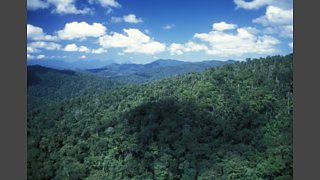Green Thinking: Soil
From farmers tending soil in Ethiopia to artists creating images of soil microbes, Des Fitzgerald looks at the latest research encouraging soil sustainability.
Soil nurtures plant, animal and human life. Industrial farming practices have depleted soil and agrochemicals have been used to revive it. In recent years some farmers have adopted regenerative methods, to create and nurture soil, before turning their attention to growing crops and livestock. So what does the latest research suggests we need to change if we are to encourage greater sustainability in our soil culture and practices? Des Fitzgerald talks to Maria Puig de la Bellacasa and Daryl Stump about how we might change the way we think about and treat soil.
Maria Puig de la Bellacasa is an AHRC Leadership Fellow and a Reader at the Centre for Interdisciplinary Methodologies, University of Warwick. Her research covers science and technology studies, feminist theory and environmental humanities. Her current work explores the formation of novel ecological cultures, looking at how connections between scientific knowing, social and community movements, and art interventions are contributing to transformative ethics, politics and justice.
Her current work explores the changes in human-soil relations. Inspired by a range of interventions and practices from science, community activism, art, and soil policy and advocacy, Maria explores contemporary human-soil encounters that happen beyond the usual uses of soil for production. Through her research, Maria hopes to change the way we relate to soils and to contribute to nurturing everyday ecological awareness.
You can find details about Maria鈥檚 research here: https://gtr.ukri.org/projects?ref=AH%2FT00665X%2F1.
And, you can watch a talk Maria gave for the Serpentine Galleries here: https://www.youtube.com/watch?v=bfNSPx24f2l
Daryl Stump is an archaeologist in the Departments of Archaeology and Environment and Geography at the University of York. His research makes use of archaeological techniques to assess the sustainability of human-environment interactions, with a particular focus on historic agricultural systems in eastern Africa. He is currently leading on the AHRC-funded project, SOIL-SAFE, which explores the benefits of soil erosion and river-side sediment traps for agricultural production and, in turn, food security. Building on relationships with agricultural NGOs in the UK, Europe and eastern Africa, this project combines archaeological, ethnobotanical and development studies research to design a method of assessing the costs and benefits of sediment traps that can be applied by NGOs and researchers to a range of social and ecological environments worldwide. It aims to benefit rural communities where soil erosion presents a serious threat to their future livelihoods.
You can find details about Daryl鈥檚 research here: https://gtr.ukri.org/projects?ref=AH%2FT004185%2F1
And here: https://gtr.ukri.org/projects?ref=AH%2FV000551%2F1#/tabOverview
Professor Des Fitzgerald is a New Generation Thinker based at the University of Exeter.
You can find a new podcast series Green Thinking: 26 episodes 26 minutes long in the run up to COP26 made in partnership with the Arts and Humanities Research Council, part of UKRI, exploring the latest research and ideas around understanding and tackling the climate and nature emergency. New Generation Thinkers Des Fitzgerald and Eleanor Barraclough will be in conversation with researchers on a wide-range of subjects from cryptocurrencies and finance to eco poetry and fast fashion.
The podcasts are all available from the Arts & Ideas podcast feed - and collected on the Free Thinking website under Green Thinking where you can also find programmes on festivals, rivers, eco-criticism and the weather. /programmes/p07zg0r2
For more information about the research the AHRC鈥檚 supports around climate change and the natural world you can visit: https://www.ukri.org/our-work/responding-to-climate-change/ or follow @ahrcpress on twitter. To join the discussion about the research covered in this podcast and the series please use the hashtag #GreenThinkingPodcast.
Producer: Ruth Watts
Featured in...
![]()
Green Thinking—Free Thinking
New thinking on the environment
Podcast
-
![]()
Arts & Ideas
Leading thinkers discuss the ideas shaping our lives.



